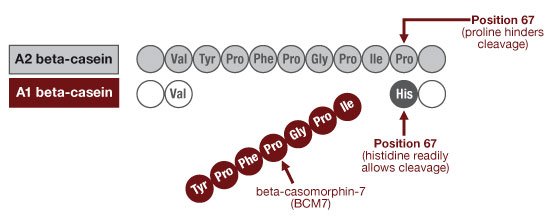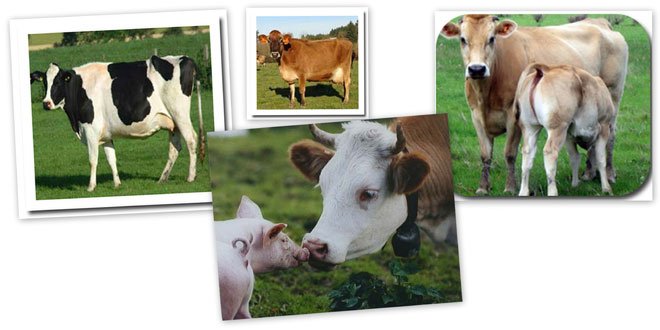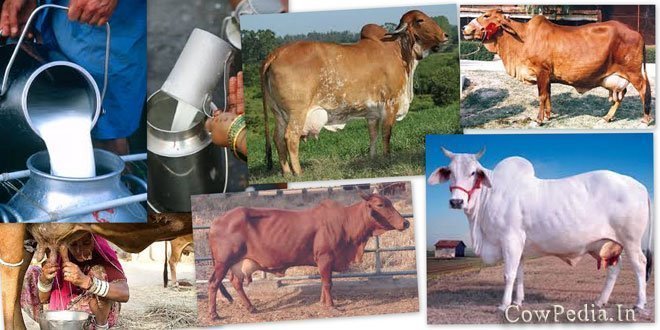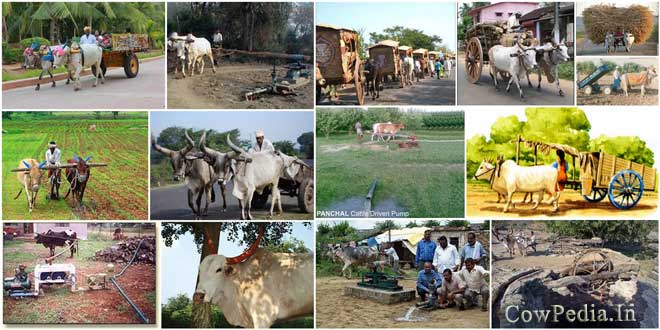a1 milk vs a2 Milk Benefits & Side Effects
The National Bureau of Animal Genetic Research has recently demonstrated the superior milk quality of Indian Zebu (humped) Cattle breeds especially cow milk. After scanning 22 cattle breeds, scientists concluded that in five types of cow high milk-yielding native breeds – Red Sindhi, Sahiwal, Tharparkar, Rathi and Gir – the status of a2 Beta – Casein gene was 100 per cent. In other Indian breeds, it was around 94%, compared to only 60% in exotic breeds like Jersey cattle and HF cow.
What is a2 Milk Benefits?
Many of us not aware of a2 Milk Health Benefits. a2 Milk is 100% natural fresh desi cow’s milk which you may find easier to digest than regular cow milk. Here’s why: Cow milk contains different types of proteins – including the ones called a1 and a2. These two proteins digest quite differently from each other and, for some people, the presence of a1 protein can result in discomfort after drinking milk. It is thanks to Dr. Corran Mclachlan back in 1997, that the impact of this difference in proteins was discovered and the importance of it came into the picture. He advised us not to take in use a1 cow milk which provides us Jersey cow and HF cow mostly in India.
a1 Milk Side Effects / Disadvantages
Do you experience digestive issues when drinking milk? You may feel bloated and uncomfortable after breakfast, or get indigestion when you have milk in your tea? Lots of people feel the same and many of them assume that they may be lactose intolerant. For millions of people, this may not actually be the case. Instead, they may be reacting to intolerance to the a1 protein – found in most milk sold in India today.
a2 Milk Advantage
The cows make all the difference! Desi cows naturally produce milk containing only the a2 protein and no a1 protein. If you also have experienced digestive issues as a result of a1 protein intolerance, by switching to desi cow’s milk you too can now enjoy the nutritional benefits of a2 Milk.
a1 Milk Vs a2 Milk
[layerslider id=”1″]Here is a fight a1 milk vs a2 milk. A1 milk is mostly given by basically two types of cow within India which includes Jersey cow and Holstein Friesian cow (HF Cow). During digestion, proteins in jersey cattle milk are broken down into peptides. Most of the peptides are converted into amino acids to be absorbed by the bloodstream. But all peptides do not get broken down into amino acids. Some are excreted in our stools and some manage to get through the leaks in the gut wall into the bloodstream while still in peptide form. a1 milk releases a peptide called BCM 7 ( Beta Caso – Morphine 7). This peptide is not broken down into amino acids, making it impossible to digest and has been associated with a very large number of diseases. Thus this BCM 7 is the “Devil in Milk” Which is not present in desi cow’s Milk.
Milk in Detail

- Milk consists of about 80% of water.
- The remaining 15% is Fat, Minerals, Proteins and Sugar Lactose.
- 80 % Protein is Casein and 20 % Whey.
- Beta Casein is 30% of total Protein content in cow milk.
What is BCM 7?
BCM 7 is a peptide, released in a1 milk.

How did it form?
- Originally all cows produce a2 Beta-Casein since they were first domesticated over 10,000 years ago.
- Some time ago, in the past few thousand years, a natural mutation occurred in some European dairy herds that changed the Beta-Casein they produced.
- The Gene encoding Beta-Casein such that, the 67th amino acid in the 209 amino acid chain, i.e. the Beta – Casein protein was switched from Proline to Histidine.
- This new type of Beat – Casein that was created is known as a1 Beta – Casein.
- The cause of concern with milk containing a1 Beta – Casein is that 67th amino acid switch from Proline to Histidine readily allows an enzyme to cut out a 7 amino acid segment of the protein immediately adjacent to that histidine. The amino acid that is separated from a1 Beta – Casein is Known as Beta – Casomorphin 7 ( BCM – 7 ).
Risk Factors with BCM 7
- Type 1 diabetes (DM-1).
- Coronary heart disease (CHD).
- Arteriosclerosis.
- Formation of arterial.
- Autism in children.
- sudden infant death syndrome
- Schizophrenia.
- Asperger’s syndrome.
- Endocrine dysfunctions like hormone imbalance, endometritis and related infertility problems in women.
- Digestive distress and leaky gut syndrome.
BCM 7, is the “Real Devil in the Milk”, It is an Exogenous opioid which does not occur naturally with human body and interacts with human digestive system, internal organs and brain stem.
Milk Nutrition
Milk is one of the richest food sources of calcium, which helps to build strong bones and healthy teeth. According to the Dairy Council, a 200ml glass of cow milk can provide over half (55%) of a child’s daily calcium requirement and over one third (35%) for an adult. As calcium is present only in very small amounts in most common foods, it may be difficult for individuals who are restricted in their intake of milk and milk products to obtain the recommended amount.
Milk is naturally full of other essential vitamins and minerals. A 189 ml serving of milk is a source of B6, Folate, Biotin and Zinc and is packed in protein riboflavin (B2), B12, calcium, potassium, phosphorus and iodine.
Milk proteins
The two main types of milk protein are the casein and the whey proteins. These makeup about 80% and 20% of the total protein content of cow’ milk respectively. Beta-casein makes up about one-third of the total protein content in milk.
All cows make beta-casein – but it is the type of beta-casein that matters. There are two types of beta-casein: a1 and a2. They differ by only one amino acid. Such a small difference can have a big impact on people who are a1 milk protein intolerant.
Feeling the difference with a2 Milk
Most fresh milk today contains both the a1 and a2 type beta-casein proteins. a2 Milk comes from Desi cows (Gir cow, Sahiwal, Tharparkar) that are specially selected to produce a2 beta-casein protein to the exclusion of a1 beta-casein protein.
These differences in protein composition between a2 Milk and other milk varieties mean that you may feel the difference after drinking a2 Milk and find that your body prefers it.
Common Issues associated with a1 milk
-
Indigestion
What is indigestion?
Indigestion is a pain or feeling of discomfort in your chest after eating or drinking.
What are the symptoms of indigestion?
The symptoms may vary in individuals but may include one or more of the following;- Feeling uncomfortably full or heavy
- Belching
- Bringing food back up from your stomach
- Bloating
- Feeling sick
- Vomiting
What causes indigestion?
Indigestion is caused by stomach acid coming into contact with the sensitive, protective lining of the digestive system. The stomach acid breaks down the lining, leading to irritation and inflammation.
How can you treat indigestion?
Whilst they may work in the short term, taking antacids to treat the symptoms rather than the cause of indigestion. Factors such as smoking, drinking alcohol, pregnancy or taking certain medications can cause indigestion although very often it can be caused by what you eat. -
Constipation
What is constipation?
Constipation occurs when a person does not have regular bowel movements.
What are the symptoms of constipation?
The symptoms may vary in individuals but may include one or more of the following;- • Stomach aches and cramps
- • Feeling bloated
- • Feeling sick
- • Loss of appetite
Who is affected by constipation?
Constipation can affect between 4% and 20% of the Indian population and is often associated with conditions such as irritable bowel syndrome.
Is Cows’ milk linked with indigestion?
Yes, absolutely A1 protein in Jersey cattle cows’ milk or Hf cow milk may cause inflammation and this could potentially lead to indigestion. If you suspect that cows’ milk is causing indigestion, then you may wish to consider a2 Desi Milk, before eliminating cows’ milk entirely. a2 Milk does not contain A1 protein therefore many people find it easier to digest. -
Irritable Bowel Syndrome
What is IBS?
IBS describes a condition where there are disturbances in the bowel and digestion.
What are the symptoms of IBS?
The symptoms may vary in individuals but may include one or more of the following;- Bloating
- Constipation
- Wind
- Stomach aches/cramps
- Diarrhoea
Who is affected by IBS?
Between 9% and 25% of people (mainly women) suffer from IBS and symptoms include diarrhoea, constipation (or both) and stomach pain.
What causes IBS?
There are different causes of IBS and there is no test for it. Diet and lifestyle can often be contributory factors for IBS.
How can you treat IBS?
Often a good starting point is to look at lifestyle factors including diet, exercise and stress.
Is cow’s milk linked with IBS?
Medical reviews have shown that the symptoms of many patients with IBS are improved once regular cows’ milk is removed from their diet. Regular cow milk means Jersey cattle cows’ milk or Hf cow milk which can be a reason for IBS in our daily diet. A1 protein, present in regular cows’ milk may cause inflammation in some people. Many people find a2 Desi Milk easier to digest. A2 Milk is a cows’ milk (Gir cow, Sahiwal, Tharparkar cow etc.) which naturally doesn’t contain A1 protein. The inflammation associated with IBS often interferes with the ability to absorb nutrients such as calcium. As a naturally rich source of calcium a2 Desi Milk may be suitable for people suffering from IBS. Cows’ milk is the main dietary source of calcium and iodine and forms part of a balanced diet.(source with editions: svsfarms.com)







Good information. Thanks a lot.
Thank for sharing with us this informative article.
Thks a lot for your valuable information..
e should make untiring efforts to increase the number of indigenious breed of cows in our country so that every where you will get only A2 milk, thus the foreign breeds will move out of the country slowly and steadily and in the process the next generation will grow stronger both mentally and physically.
Great Info… Man . Keep it up
Please help us differentiating the cow milk if it is of desi cow or jersey. The reason is the milk boy claims he is delivering the desi cow milk, but we want to confirm on our own. Please help
visit the farm from where you are getting the milk and find out for yourself whether he is maintaining any desi cows or not.
Very well explained.Thanks a ton
Does HF (Holstein Friesian cattle) cow produce a1 milk or a2?
YOUR ARTICLES ARE VERY USEFUL & IMPLEMENTABLE …… FOR US…….THANKS A LOT….JAI GAU MATA- JAI GOPAL
PLEASE GIVE DETAIL REGARDING COW MILK A1 AND A2 PROTINE AND HOW WE CAN DIFFER OR CHECK IN OUR MILK OF DAILY USE.